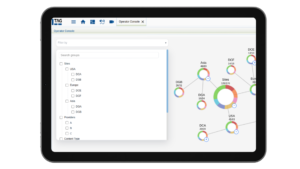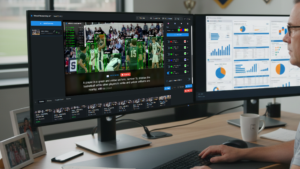August 2024
MediaTech Radar is a monthly newsletter put together by IABM’s Business Intelligence Unit. It focuses on a spotlight topic in MediaTech and reflects on a series of past, present, and future business developments in the industry. In this edition, our spotlight topic is the Paris 2024 Olympic Games. With last Sunday’s Closing Ceremony heralding the end of the 2024 Olympic games in Paris, the IABM’s Business Intelligence Unit reflects on a summer of sport and the cutting-edge technology deployments that deserve their own gold medals.
Live broadcast is an integral part of the Olympic experience. From capturing ground-breaking achievements in stunning detail to helping audiences at home personalize what they watch so they don’t miss a moment, each successive edition of the legendary games moves our industry forward. With Olympians pushing their limits in the arena, the world’s best athletes are often challenging the technology to keep up.
As a result, the Olympics are equally a showcase and celebration of the advances made by our industry, as the culmination of the work by both MediaTech suppliers and end-users plays a vital role in elevating the experience for audiences at home.
While Tokyo 2020 was a defining moment for remote production, as the unique conditions of the pandemic focused innovation on navigating the challenges of broadcasting safely, broadcasters have enjoyed greater freedom with Paris 2024 to pursue different trajectories for pioneering new technology. Here are some of the leading technology initiatives that took place at the 2024 Olympic Games.
Software-defined production
Olympic Broadcast Services (OBS) successfully utilized a total of 11 software-defined production galleries for their coverage across three venues. The typical use of outside broadcast vehicles and flypacks was replaced with a new virtualized production environment based on a cabin full of commercial off the shelf (COTS) servers for the shooting at Châteauroux, judo and wrestling at Champs-de-Mars, and segments of the tennis at Roland Garros. Virtualization brought benefits in density, increasing capacity for signal transport while reducing the physical footprint of hardware, which in turn reduced power consumption and cooling.
Volumetric Video
Volumetric video acquisition was used to capture 3D scans of Olympians in motion using Intel Xeon processors. These assets helped increase broadcasters’ access to competitors and winners, as 3D assets were provided by OBS to rights holders that they could incorporate into their own broadcasts. The detailed volumetric captures of athletes were used in a range of innovative ways, from being inserted into mixed reality virtual studios to being showcased for replays and analysis.
IP & ST 2110
Extensive use of SMPTE ST 2110 underpinned the scale of live broadcasting that was achieved across the Paris 2024 Olympics. In conversation with SVG Europe, the CTO of OBS, Sotiris Salamouris described how the use of IP enabled them to deliver nearly 5,000 different feeds to rights holders: “There is no way we can manage this complexity and this volume of distribution in a live environment using old technology. Everything is ST 2110, and we convert it only at the edge. But we see more and more broadcasters taking ST 2100 directly, and they also see a big difference in the ease of use because they no longer have the spaghetti of cables.”
Artificial Intelligence
Although AI has been in use by OBS since 2016, the scope of its application has expanded. AI editing is becoming integral to the creation of highlights packages to serve more customized content and personalization to audiences from the thousands of hours of content captured at the games, for both OBS and individual broadcasting rights’ holders. Despite caution around the use of AI and job security, usage at the Olympics is an ideal demonstration of how AI can be used to increase output rather than downsize production crews.
Watchlist
A watchlist of selected past, present and future business developments in MediaTech.
- Last month, BBC Studios and Samsung TV Plus struck up a deal to deliver FAST channels to additional markets in EMEA. Partnerships like this between broadcasters and TV manufacturers to expand the reach of FAST channels are a rising trend, driven by the need to scale content distribution, increase monetization through advertising, and compete against subscription-based streaming services. Kasia Jablonska, Director of Digital and On-Demand for EMEA at BBC Studios announced, “I am so proud to announce the expansion of BBC Drama and Top Gear FAST channels with Samsung TV Plus, giving new audiences across EMEA access to the suite of bingeable content from BBC Studios’ world-renowned catalogue.”
- On July 11th, Grass Valley and Diversified signed a new multimillion-dollar strategic partnership agreement. The increased collaboration between the manufacturer and solutions provider is intended to allow the two organizations to develop new service models using Grass Valley’s technology, in tandem with Diversified’s experience in deployment to deliver enhanced training and support to customers. Steve Stubelt, Senior Vice President of Sales – Media and Entertainment at Diversified stated: “Together, we will broaden our reach and enhance our ability to deliver cutting-edge, integrated solutions that meet the complex needs of our clients in the media and entertainment industry.”
- During July Warner Bros. Discovery was reported to cut nearly 1,000 jobs. This comes as the latest round in a series of layoffs since the merger of Discovery and WarnerMedia in April 2022; however cuts are less extensive than those made last year. Less than 10 employees at the organization’s streaming platform, Max, were impacted, as growth of WBD’s OTT offering remains instrumental to the company’s future growth strategy. In WBD’s Q2 earnings report released this month, CEO David Laslav stated: “In light of industry headwinds, we have and will continue taking bold steps, like reimagining our existing linear partnerships and pursuing new bundling opportunities, with the goal to get Max on the devices of more consumers faster and at a fraction of the acquisition cost.”
- At the end of July, Amazon Prime Video purchased Bray Studios, its first studio in the UK. Home of the Hammer Horror films, Bray Film Studios were recently refurbished to play host to production of the streamer’s second season of The Lord of the Rings: The Rings of Power. With substantial demand for studio space for high-end film and TV production in the UK, Amazon Prime Video looks to secure its future by taking over ownership of its now proven production base. Of the purchase, Mike Hopkins, Head of Prime Video and Amazon MGM Studios said, “The acquisition of a studio with such a storied heritage not only empowers us to produce more film and television in the U.K., but also unveils a wealth of opportunities in the local community with respect to jobs and skills training at all levels of the production process.”
- At the start of August, EVS announced the acquisition of MOG Technologies and an investment in Tinkerlist. MOG Technologies’ staff will join EVS to integrate the Portuguese company’s ingest and transcode products into EVS’ portfolio. In parallel the investment in Tinkerlist will help propel the company’s rundown and automation solution, Cuez, to new customers, with EVS’s CFO, Veerle De Wit, appointed to Tinkerlist’s board. Serge Van Herck, CEO of EVS, noted “We are very proud to become a shareholder in such a promising and innovative company that re-invents the way to produce live content. EVS now owns an important minority stake in Tinkerlist, allowing the team to remain independent and autonomous while supporting their growth and ambitions.”
- Earlier this month, Disney revealed plans to invest over $5 billion in the UK and continental Europe over the next five years, focusing on blockbuster movies, TV shows, and streaming content. The success of Deadpool & Wolverine has emboldened the company despite the future of its superhero franchises looking uncertain amidst recent calls of franchise fatigue from audiences and waning box office performances from other titles in the Marvel Cinematic Universe. However, other hits like Inside Out 2 have boosted Disney’s earnings. Disney is committed to expanding its production in Europe, with Pinewood Studios playing a central role, and aims to enhance Disney+ as a key player in the competitive streaming market. Disney’s European Chief, Jan Koeppen boasted “We’ve always had amazing content, and that is what really will make us win in the end.”
Thank you for reading this newsletter. If there are topics you would like us to cover or if you have information/ideas that you would like to share, please get in touch with us.
The IABM Business Intelligence Unit









